Nous croyons que les médias civiques générés localement, à partir de perspectives diverses, rendent notre ville plus forte. Rejoignez l’équipe ACTUALITÉS et participez au renforcement de notre démocratie locale. En tant que contributeur(trice) à l’équipe ACTUALITÉS, vous aurez accès à une formation sur tous les aspects de la collecte d’ACTUALITÉS et de la production audio. Nous recherchons des individus pour contribuer:
1) Rapports quotidiens sur les actualités. Il s’agit de mises à jour de ACTUALITÉ de 3 minutes au maximum, comprenant généralement 3 titres et diffusés en anglais et en français. Vous pouvez choisir de contribuer quotidiennement, hebdomadairement ou occasionnellement en français ou en anglais. Voici un exemple.
2) Histoires de ACTUALITÉS. Ce sont des histoires de 5 à 7 minutes qui rapportent un problème ou un événement spécifique. Ces histoires de NEWS comprennent généralement des recherches, des entretiens et un bref résumé écrit. Voici un exemple.
NOUVELLES
CATÉGORIES
LANGUE
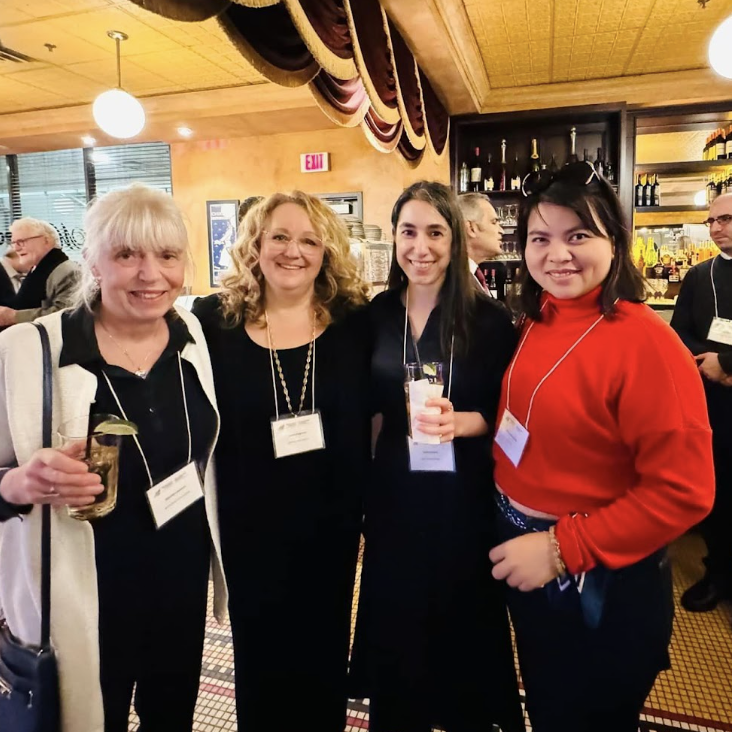
Parujee Akarasewi • Nov 20, 2024
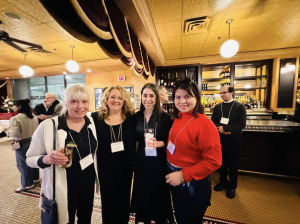
Kaitlin Kharas’s Mother, Dr.Lee Augimeri, Kaitlin Kharas and Parujee (Mickey) Akarasewi from CHUO 89.1 FM.
The prestigious Research Canada’s Leadership in Advocacy Awards took place at the Metropolitan Brasserie Restaurant, Nov. 19, 2024. CHUO had the honour of attending the event, which was a remarkable celebration of individuals and organizations whose advocacy efforts have made a significant impact on the health research community in Canada.
The evening highlighted the transformative work of three distinguished awardees who have each demonstrated outstanding leadership in advocating for health research and innovation.
2024 Leadership in Advocacy Awardee: Dr. Leena Augimeri
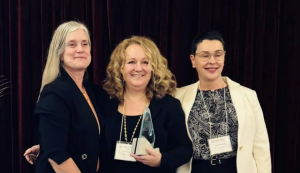
(From left to right) Alison Evans, President and CEO of Research Canada, Dr. Leena Augimeri, Stephanie Michaud PHD.
The highest honour of the night, the Leadership in Advocacy Award, was presented to Dr. Leena Augimeri, a renowned specialist and innovator in child and youth mental wellness and crime prevention.
With nearly four decades of experience, Dr. Augimeri’s work has been transformative in the fields of mental health and crime prevention for children and youth. As the Chair of the Ontario Youth Justice Task Force, Adjunct Professor at the University of Toronto, and Co-Founder of SNAP and EARL Programs, Dr. Augimeri has been at the forefront of developing programs that provide early intervention and support for at-risk youth. Her advocacy efforts have not only contributed to research and development but have also created practical solutions for improving mental health and reducing youth involvement in crime.
Dr. Augimeri’s leadership in mental health advocacy has left an indelible mark on the Canadian landscape, earning her this well-deserved recognition for her lifelong commitment to advancing the well-being of children and youth.
2024 Organization Leadership in Advocacy Awardee: JDRF
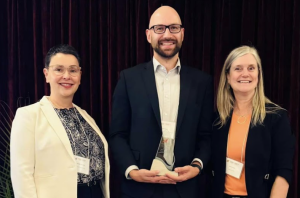
The 2024 Organization Leadership in Advocacy Award was presented to JDRF, the leading global organization dedicated to funding type 1 diabetes (T1D) research. JDRF has been a vital advocate for T1D research, ensuring that the needs of Canadians living with the condition are met at every stage of the research pipeline.
Whether advocating for funding for groundbreaking discoveries or pushing for regulatory changes that accelerate the approval of new treatments, JDRF’s efforts have been crucial in improving the lives of those living with T1D. Additionally, JDRF has worked tirelessly to secure public and private reimbursement for the medications, devices, and treatments that Canadians with T1D rely on daily.
Their advocacy work exemplifies how organizations can make an impactful difference in health research and policy, securing a brighter future for individuals with chronic conditions.
2024 Emerging Leader in Advocacy Awardee: Kaitlin Kharas
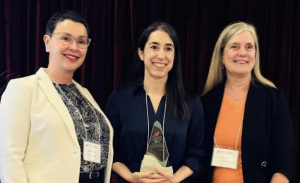
(From left to right) Alison Evans, President and CEO of Research Canada, Kaitlin Kharas, Stephanie Michaud PHD.
In a new category this year, the ‘Emerging Leader in Advocacy Award’ was given to Kaitlin Kharas, a trailblazer in science policy advocacy.
Kaitlin has demonstrated exceptional leadership as the previous Co-President of the Toronto Science Policy Network and now as the Executive Director of Support Our Science. Her advocacy journey, driven by her passion for science and its role in shaping public policy, has gained widespread recognition both nationally and internationally.
As a PhD candidate, Kaitlin has shown tremendous promise in using her scientific expertise to drive policy change. Her advocacy work continues to inspire others, positioning her as a rising star in the world of science policy. Kaitlin’s recognition as an Emerging Leader in Advocacy highlights the importance of fostering young leaders who will continue to advance the cause of health research in Canada and beyond.
A Night to Remember
The 2024 Research Canada’s Leadership in Advocacy Awards was a momentous occasion, showcasing the power of advocacy in shaping the future of health research in Canada. Each of the awardees has made significant contributions to their respective fields, advancing policies, securing funding, and improving the lives of Canadians.
The evening was a reminder of the collective effort required to support health research and innovation, and the profound impact that advocacy can have in transforming lives and shaping policies for the betterment of all.
Congratulations to Dr. Leena Augimeri, JDR, and Kaitlin Kharas for their outstanding achievements. Their work will undoubtedly continue to inspire future generations of advocates who are passionate about making a difference in the health research community.
As we look to the future, the 2024 Leadership in Advocacy Awards set the stage for continued growth and collaboration within the health research sector, ensuring that Canada remains a leader in scientific innovation and public health advocacy.
Celebrating Excellence in Health Research Advocacy: Research Canada’s Leadership in Advocacy Awards 2024
Nov 20, 2024 • Parujee Akarasewi
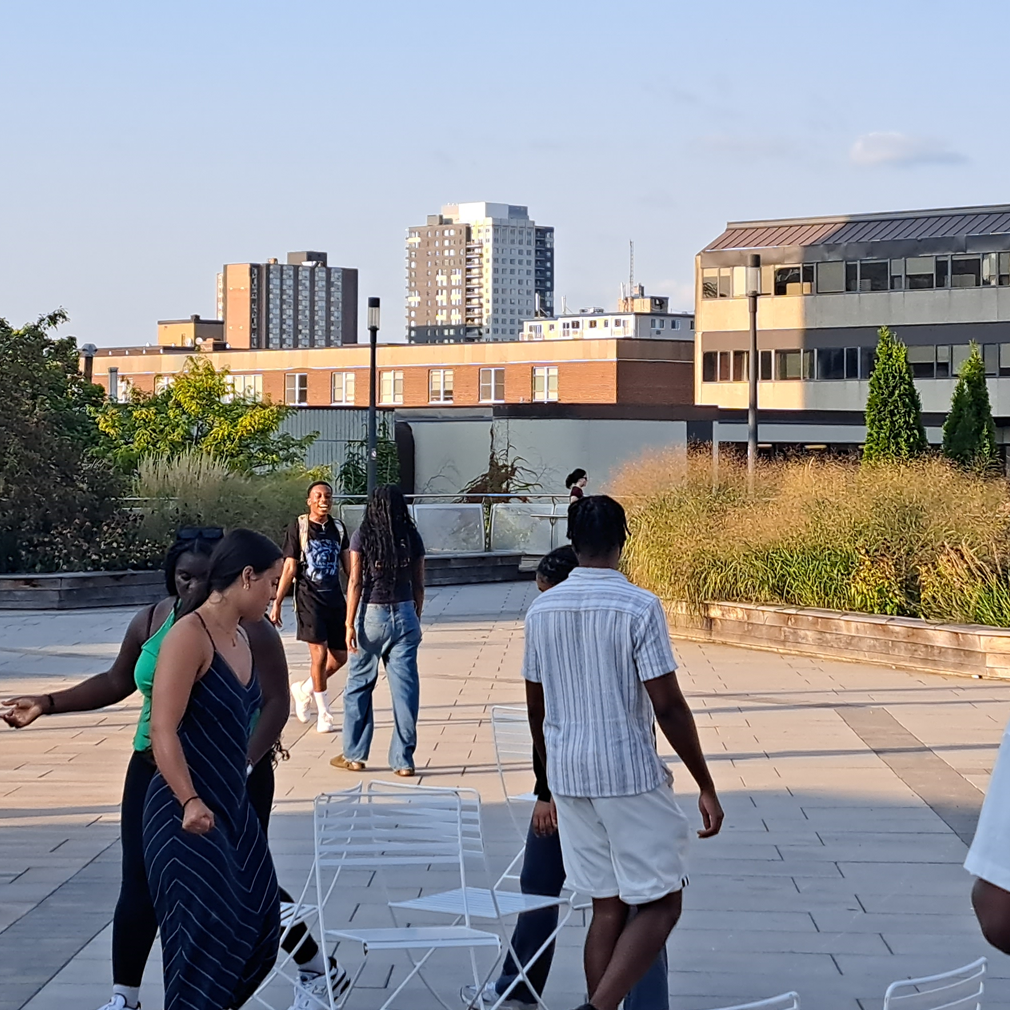
Vuk Cvetanovic • Nov 1, 2024
Fondée en Janvier, l’Association des étudiants noirs en STIM, ou l’AÉNS, à offert un environnement dynamique et amusant pour les étudiants du premier cycle à l’université d’Ottawa.
Voyant une croissance continue depuis sa fondation, le club à organisé une variété d’activités sociales durant la rentrée, passant de soirées de jeux de sociétés, des discussions sur la santé mentale parmi la population noire francophone, allant jusqu’à une grande fête sur le campus en collaboration avec plusieurs autres organisations universitaires.
La station a eu le plaisir d’entrevuer Agape Williams, co-présidente du club, qui à souligné l’essor fulgurant de l’association, mais aussi des défis et des aspirations qu’elle et ces collèges désirent apporter à l’université, qu’ils espèrent perdureront bien après leur mandat.
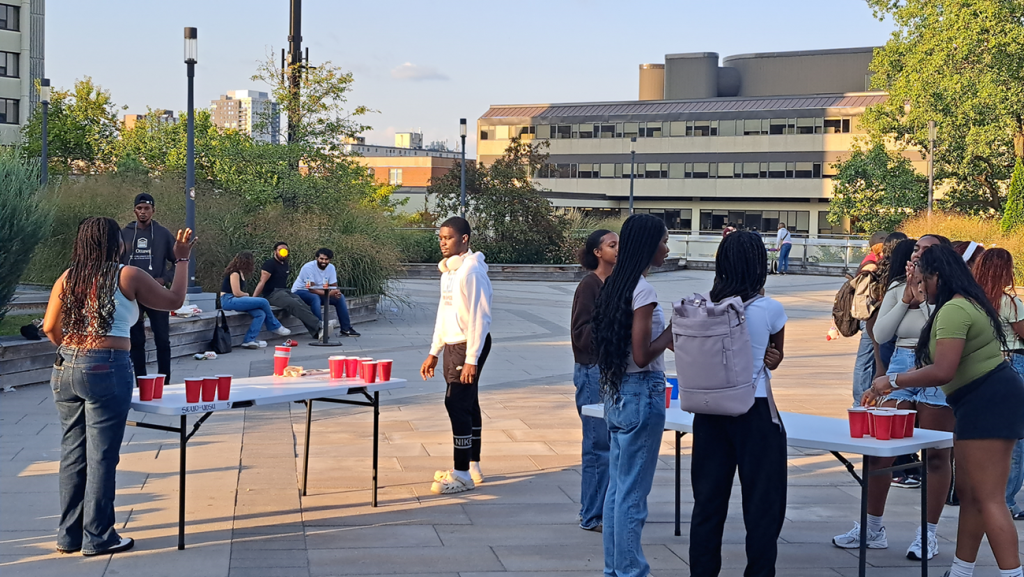
Des photos prises durant la fête organisée par l’AÉNS (Vuk Cvetanovic\ CHUO)
Vuk: Commençons donc par une courte introduction. Pouvez-vous nous parler de vous et de votre club?
Agape: Je m’appelle Agape Williams, je suis étudiante en quatrième année de sciences biomédicales avec une spécialisation en neurosciences à l’Université d’Ottawa, et je suis l’une des cofondatrices de l’association des étudiants noirs en STIM. Il y a moi, Nia Simpson-Stairs, qui est également étudiante en quatrième année de sciences biomédicales, ainsi qu’Uche Nworah, elle aussi en quatrième année, mais en biochimie, et nous avons décidé de créer ce club parce que nous avons remarqué le manque de représentation des étudiants noirs dans les STIM.
Nous voulons offrir aux étudiants de ces disciplines une communauté chaleureuse et accueillante, surtout pour ceux qui sont en première année. Imaginez à quel point il serait angoissant de venir à l’école et de ne pas avoir d’endroit où trouver de l’aide, des ressources ou des conseils pour passer de l’école secondaire à l’université, ou même de la première à la deuxième, à la troisième et à la quatrième année, vous savez ? Nous voulons absolument créer une communauté stable où nous pouvons aider les gens à saisir le plus grand nombre d’opportunités possible. C’est pourquoi nous avons créé l’association des étudiants noirs des STEM.
Vuk : Depuis la création du club, comment s’est-il développé et quel effet a-t-il eu sur la communauté étudiante ?
Agape : Nous avons complété notre constitution en janvier et nous nous sommes énormément développés tout au long de l’année. Je suis en fait très choquée par l’ampleur que nous avons prise, et cela montre à quel point ce type de club était nécessaire à l’école. J’ai l’impression qu’un club de ce genre s’est révélé fort nécessaire, surtout pour les étudiants de première année qui sont arrivés en septembre, et j’ai l’impression que cela les a beaucoup aidés. J’ai remarqué que lors de beaucoup de nos événements, beaucoup d’étudiants de première année viennent, et ils sont comme : « Oh mon Dieu, je ne savais pas que ça existait ! ». Parce qu’il y a beaucoup d’autres clubs, mais aucun n’est destiné aux étudiants noirs dans le domaine des STIM. C’est bien de savoir que nous sommes capables d’aider les gens par ce biais.
Vuk : Oui, c’est vraiment encourageant d’entendre parler de l’expansion du club et de l’aide qu’il a apportée aux nouveaux étudiants venant d’environnements francophones et anglophones, qui voient un endroit vers lequel se tourner. En ce qui concerne la situation linguistique, le club s’adresse-t-il à une seule communauté linguistique ou s’est-il développé dans un contexte plus bilingue ?
Agape : C’est une bonne question.
Nous sommes officiellement un club bilingue, et nous pensons que l’Université d’Ottawa, qui est une école très bilingue, devrait avoir un club qui s’adresse à la fois aux communautés francophone et anglophone dans tous les aspects. Nous pensons que les étudiants francophones constituent également un groupe minoritaire, et nous voulons donc les représenter. Récemment, nous avons organisé une discussion sur la santé mentale des Noirs à l’intention des étudiants francophones, qui a été menée par une équipe de chercheurs francophones. Les réactions des gens semblent montrer qu’ils sont très enthousiastes à l’idée du prochain événement.
«Imaginez à quel point il serait angoissant de venir à l’école et de ne pas avoir d’endroit où trouver de l’aide, des ressources ou des conseils pour passer de l’école secondaire à l’université?»
– Agape Williams, AÉNS
Vuk : C’est une bonne nouvelle ! Y a-t-il eu une collaboration plus poussée avec d’autres clubs ou organisations sur le campus ?
Agape : Oui ! Nous avons collaboré avec l’ABAP (Association of Black Aspiring Physicians) et nous avons organisé une petite séance de bachotage au cours de laquelle nous avons distribué de la limonade et des en-cas. Ensuite, nous avons organisé un barbecue, où nous avons collaboré avec de nombreuses personnes, dont la station CHUO, qui était génial, ainsi qu’avec le fonds de dotation pour l’ingénierie et le fonds Youth Action Now. Nous avons également collaboré avec la SNIN (Société nationale des ingénieurs noirs), ce qui est formidable parce que nous essayions vraiment de nous concentrer sur l’aspect ingénierie des STIM. Nous allons certainement collaborer avec d’autres clubs au fur et à mesure que nous grandissons, pour continuer à construire un réseau de clubs adaptés aux étudiants noirs dans le domaine des STIM.
Vuk : Quels sont les événements que vous avez prévus à l’avenir ? Je sais qu’il y a une soirée jeux le 1er novembre, et peut-être d’autres activités, peut-être pour Haloween ?
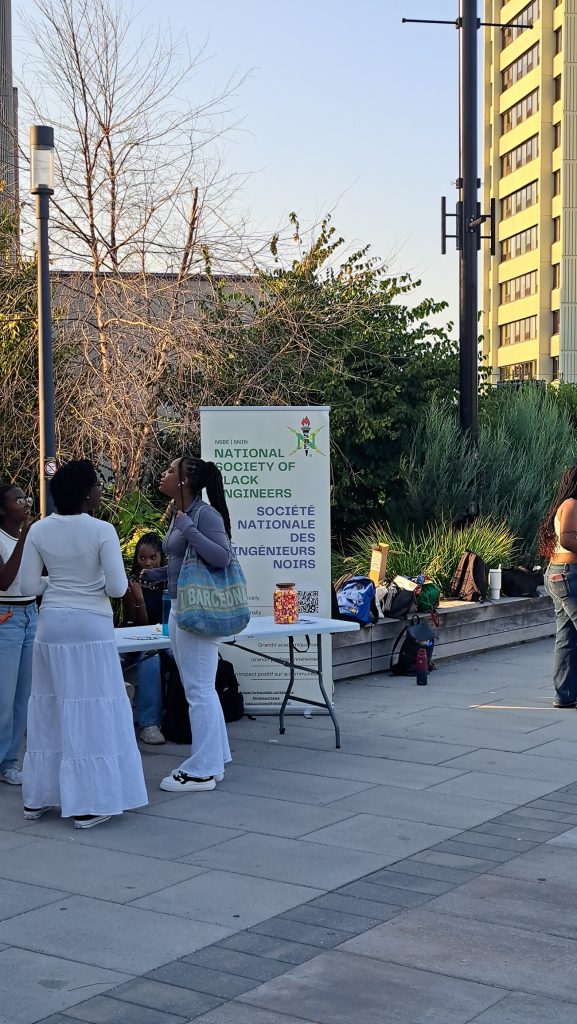
(Vuk Cvetanovic\CHUO)
Agape : Oui, bien sûr ! Nous organisons notre soirée jeux, comme tu l’as dit, et chaque année, les clubs doivent tenir une assemblée générale annuelle où les membres peuvent venir en apprendre davantage sur le club. De 18 heures à 20 heures, nous parlerons du club, mais nous avons également prévu une soirée de jeux, de type trivial, avec peut-être un peu de nourriture et des boissons. C’est le premier événement qui aura lieu le 1er novembre, car nous n’avons malheureusement pas eu le temps de faire quoi que ce soit en rapport avec Halloween, ce que j’aurais aimé, mais nous essayons de nous réorienter vers le côté plus intellectuel de notre club plutôt que vers les événements sociaux que nous avons organisés récemment. Nous essayons de nous concentrer davantage sur l’acquisition de compétences et tout ce qui s’y rapporte, c’est pourquoi nous organisons un événement de réseautage qui aura lieu le 21 novembre dans le bâtiment STEM, et nous en sommes très heureux. Nous allons faire venir de nombreux professionnels des STIM pour qu’ils racontent comment ils sont entrés dans leur domaine, quels défis ils ont dû relever en tant que Noirs dans leur domaine, et bien d’autres sujets de ce genre, et nous sommes donc très enthousiastes. Nous sommes également en train de discuter de l’organisation d’un événement social de type vacances avant ou après la saison des examens. Ce sont les trois principaux événements que nous prévoyons pour l’instant.
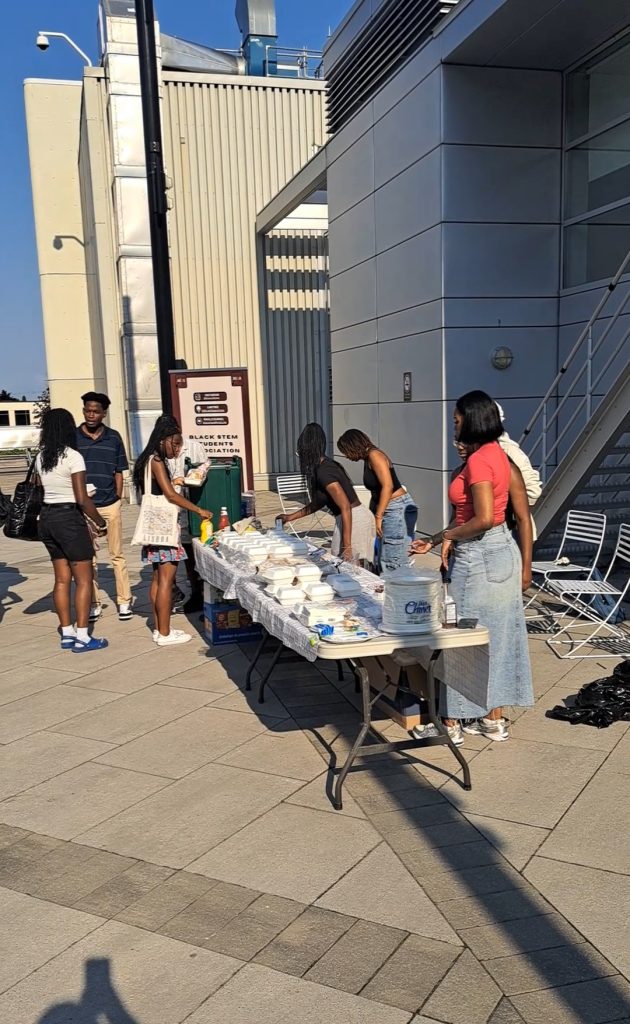
(Vuk Cvetanovic \ CHUO)
Vuk : Cela à l’air très amusant. En parlant de réseautage, lorsque vous parlez à de nouveaux membres, qui sont peut-être moins au courant de l’existence de l’AÉNS, comment résumeriez-vous le club, peut-être au moyen d’une dévise?
Agape : Bien sûr. Personnellement, j’aime bien dire que je l’appellerais simplement un foyer. Je ne veux pas l’appeler de façon trop compliquée en utilisant de grands mots pour effrayer les gens, car lorsque les gens pensent au club, ils se disent probablement : « C’est probablement un club où je ne peux pas m’amuser, ou c’est juste des trucs techniques », mais nous avons vraiment voulu être une communauté de soutien où les gens peuvent venir, poser des questions, obtenir des réponses, et s’amuser. Je sais que lorsque je suis arrivé à l’université, je ne connaissais rien du tout, et c’est vraiment ce que nous voulons faire : donner autant d’opportunités et de ressources que possible tout en ayant un endroit où les gens peuvent se faire des amis. C’est donc essentiellement ce que représente l’AÉNS, et ce que nous aimerions faire connaître aux gens.
Vuk : Dans le sillage de COVID, beaucoup d’anciens clubs ont vu leur nombre de membres chuter, ce qui a découragé les nouveaux étudiants et ceux qui revenaient. C’est donc formidable d’entendre parler d’un club où ces étudiants peuvent trouver et construire un réseau de soutien dans le contexte de clubs émergents comme l’AÉNS.
Agape : Exactement.
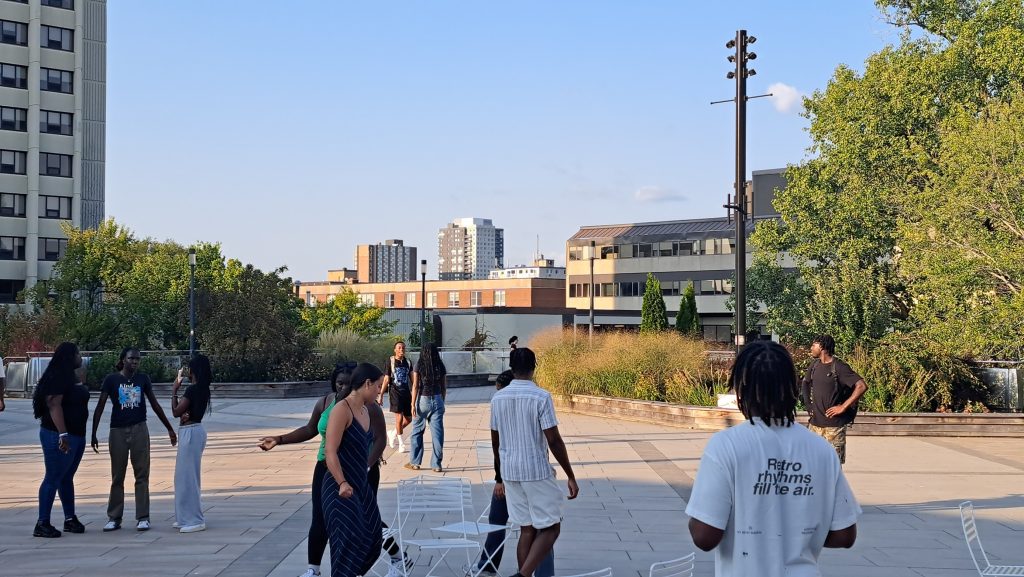
(Vuk Cvetanovic\ CHUO)
Vuk : À plus long terme, quels sont les objectifs que le club aimerait poursuivre dans les mois, voire les années à venir ?
Agapè : Oui. Une chose que nous aimerions vraiment faire, et dont nous sommes en train de discuter avec Jaclyn Brusso, comme je l’ai déjà mentionné, c’est d’assurer la continuité.
Moi, Uche et Nia sommes tous des étudiants de quatrième année, ce qui, heureusement et malheureusement, signifie que nous obtiendrons bientôt notre diplôme, alors nous voulons que notre club soit solidement intégré à l’infrastructure de l’Université d’Ottawa. Nous voulons nous assurer que lorsque nous partirons, le club ne partira pas non plus. En ce moment, nous sommes en train de discuter d’un rapprochement avec la faculté, car une fois que le club sera dans le système de la faculté, il sera beaucoup plus difficile de s’éteindre. C’est la chose la plus importante que nous essayons de faire, mais à l’avenir, nous espérons que ce sera quelque chose que tout le monde connaîtra en venant à l’Université d’Ottawa. Ce sera un grand club, où nous ne nous contenterons pas de proposer des activités sociales et de réseautage amusantes, mais où nous organiserons également des activités de recherche ou des bourses d’études, afin d’offrir tout ce que nous pourrons. Nous visons à faire plus et mieux, chaque jour et chaque année, c’est notre objectif.
Nous aimerions également disposer d’un fonds que nous pourrions remettre aux étudiants en STIM afin qu’ils puissent réaliser ce qu’ils souhaitent, qu’il s’agisse de faire de la recherche, d’acquérir de l’expérience dans un laboratoire ou de coder, ou quelque chose de ce genre. Nous sommes en train de nous inscrire pour un fond afin de pouvoir faire cela avec Jaclyn Brusso, Vice-doyenne en affaires professorales et excellence en matière, alors croisons les doigts pour que tout se passe bien. Je suis vraiment contente de la façon dont les choses se passent, et je sais que ça ne fera que s’améliorer à partir de maintenant.
..«.à l’avenir, nous espérons que ce sera quelque chose que tout le monde connaîtra en venant à l’Université d’Ottawa.»
«… à l’avenir, nous espérons que ce sera quelque chose que tout le monde connaîtra en venant à l’Université d’Ottawa.»
– Agape Williams, AÉNS
Vuk : Avez-vous rencontré de jeunes espoirs qui, selon vous, pourraient constituer la base d’une nouvelle génération de dirigeants de l’AÉNS ?
Agape : Oui, surtout au sein de notre équipe de direction. Nous sommes entre 20 et 23 personnes au total, donc un groupe très important, surtout comparé à beaucoup d’autres clubs. Nous voulons nous assurer que lorsque nous partirons, les autres pourront continuer à faire vivre le club. Nous sommes en train de discuter pour trouver un vice-président, puisque nous sommes tous les trois présidentes, et nous voulons quelqu’un qui soit un an ou deux plus jeune que nous. Nous pensons organiser une élection partielle prochainement, peut-être avant le prochain semestre, afin de pourvoir ce poste, mais nous avons veillé à ce qu’un grand nombre de membres de première, deuxième et troisième année fassent partie de notre club, afin que la transition se fasse le plus facilement possible. Ils sont déjà dans le club, donc ils apprennent déjà ce que nous représentons et ce que nous faisons, donc ils pourront continuer à le faire. Croisons les doigts !
Vuk : Formidable! Avez-vous un dernier commentaire ou conseil à donner ?
Agape : Oui, bien sûr ! Je pense qu’une chose que je fais… Je ne sais pas pourquoi je commence mon conseil par un regret, mais ce que je regrette, c’est de ne pas avoir créé ce club plus tôt. J’aurais vraiment aimé le faire, peut-être en deuxième année, parce que c’est la première fois que j’ai pensé à créer quelque chose comme ça, mais j’étais un peu trop nerveuse pour le faire jusqu’à cette année, quand deux autres personnes ayant la même vision ont commencé à le faire avec moi. En résumé, faites ce que vous pensez être le mieux, tout ce qui vous passe par la tête, faites-le ! Si nous avions créé le club plus tôt, peut-être que certaines personnes auraient eu accès à des opportunités que nous aurions pu leur offrir et qu’elles n’auraient pas pu obtenir autrement. C’est l’un de mes plus grands regrets, mais au moins il a commencé maintenant, donc voila. N’ayez pas peur de faire quelque chose,et si vous voulez créer un club, créez-le ! Nous ne pensions pas que nous allions grandir autant, mais nous l’avons fait, et nous en sommes très heureux.
Vuk : Merci pour ce conseil formidable, et merci beaucoup, Agape, pour l’entrevue. Bonne chance à toi et à l’association des étudiants noirs en STIM !
Agape : Merci beaucoup de m’avoir invitée !
Plus d’informations sur l’AÉNS peuvent être trouvées en consultant leur page Instagram.
Un club en croissance offre un foyer pour les étudiants noirs en STIM
Nov 1, 2024 • Vuk Cvetanovic
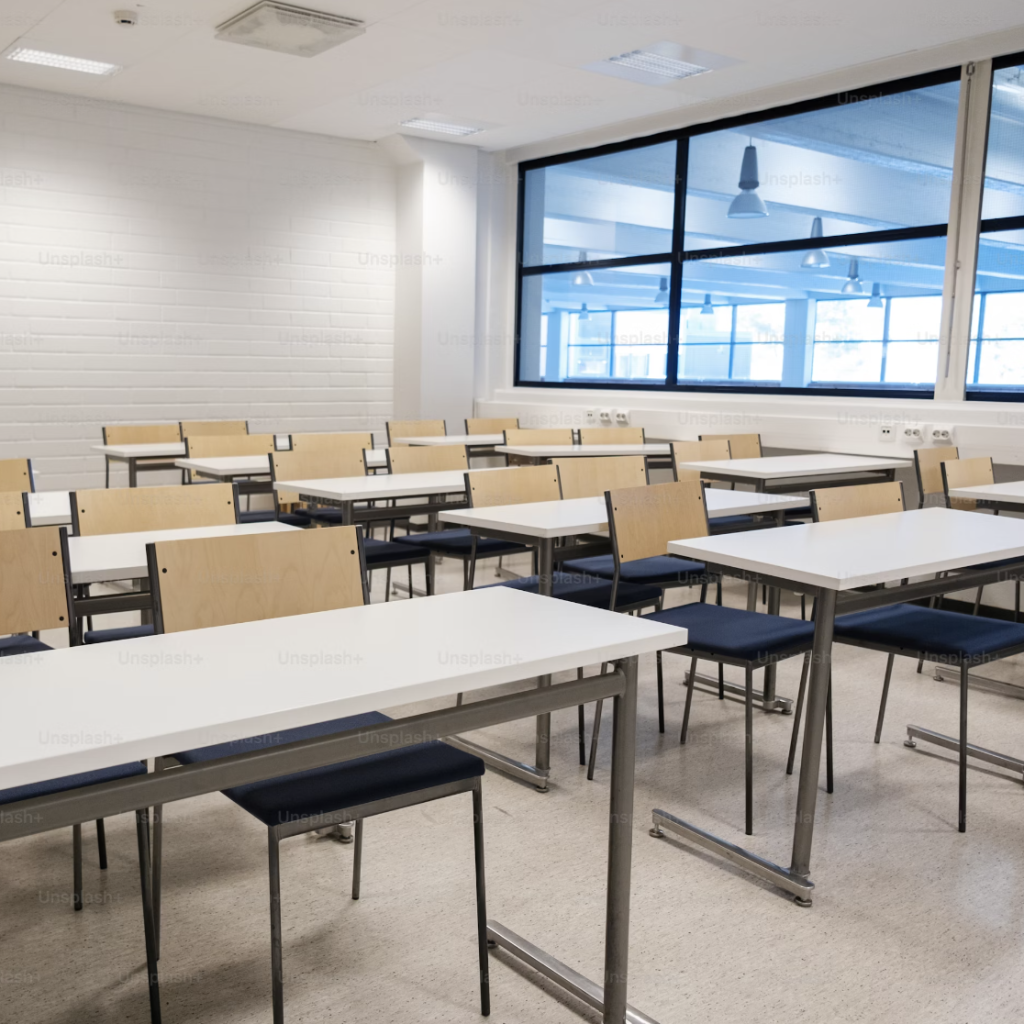
Christelle Dorvil • Oct 29, 2024

(Kübra Arslaner/UNSPLASH)
This fall semester multiple post secondary institutions in Ontario saw a decrease in enrolment from international students.
Mohawk College’s campuses record only receiving about 1,500 international students in the fall, a 38 per cent decrease from the year prior. St.Lawrence College in Kingston reports that 1,600 students were expected to attend but only 775 students have enrolled in courses for this term.
They state many students haven’t received their Visas on time, but there’s a lot to unpack on what’s hindering them from their studies.
In January, Immigration Minister Marc Miller announced Ottawa would reduce the number of international student permits by 35 per cent as part of a temporary two-year cap.
So this year, post-secondary schools have implemented stricter Visa requirements including the need to submit a provincial attestation letter or a territorial attestation letter to Immigration, Refugees and Citizenship Canada.
The attestation letters must be provided with their study permit application or their application will be returned. This whole process seems to have caused delays for multiple international student Visas.
The sharp decline in international student enrolments can also be attributed to work permit restrictions.
Post-Graduation Work Permits (PGWPs) will now only be given to college students who study in fields with labour shortages, like STEM programs. This means that international students who have applied to Canadian programs that are not eligible for a work permit may be rethinking their choice of pursuing education in Canada.
According to the Government of Canada, work permits offered to spouses of the students will also be restricted to spouses of master’s or doctoral studies. Any other level of education will not be approved.
Canada’s new international student policies have clearly played a role in this year’s low international student enrolments, and the policies are coming at a time where the country faces growing anti-immigration sentiments around the cost of living.
Immigration increased during the pandemic in order to address labour shortages. The Prime Minister intends on cutting immigration levels within the next few years after stating his government “didn’t get the balance quite right.”
This will be done in order to allow provinces to catch up on healthcare and housing stock. In January, the Government of Canada issued a news release informing the public of their intentions to reduce the number of international student permits.
They cite a lack of support the students receive as well as the pressure they put on housing and healthcare. Statistics Canada reports that over half of people aged 25 to 44 say that rising prices are greatly affecting their day-to-day expenses, as well as 46 to 47 per cent having high financial stress and expectations to obtain food from a food bank.
To apply for a study permit the cost of living requirement has been set at $10,000 since the early 2000s, but this year it’s being re-evaluated. New requirements were put in place in order to better reflect Canada’s cost of living.
The government states that a single applicant must have $20,635 in addition to first year tuition and travel cost. This measure was put into place to prevent international students from being vulnerable and exploited upon coming to Canada, according to Canadian immigrant magazine.
International students’ families face troubles finding housing that fits their needs due to lack of diverse options. One family reported to the University of Waterloo’s Faculty of Environment that they were living in an Airbnb because they needed to find a place where their kids could start school.
Other countries such as the United states and United Kingdom have subsidized housing for international students
Students’ mental health has also been impacted by the uncertainty of immigration policies and permits, and they’re further impacted by limitations of income earned and job opportunities.
Ontario is seeing big changes in its post-secondary institutions. According to the Borden Ladner Gervais law firm, the province hosts over 50 per cent of the international students in Canada.
Conestoga College has reported that 1400 of their international students have deferred their programs to the winter semester.
With these changes one could assume students are waiting to see how these changes officially unfold and affect their likelihood of becoming a permanent resident, deferring and weighing the benefits of pursuing an education in Canada.
But the students aren’t the only ones who are feeling disoriented by these restrictions, universities and colleges are also feeling a financial kind of loss. According to a 2022 provincial auditor general report, Ontario international students make up 68 per cent of tuition revenue at 24 Ontario colleges… and over 90 per cent at some Northern Ontario colleges.
The Council of Ontario Universities says the Federal limits could cost Ontario schools close to one billion dollars in lost revenue.
International Students face new struggles in post-secondary institutions
Oct 31, 2024 • Chrystelle Dorvil

CHRISTELLE DORVIL • OCT 21, 2024

(Tingey Injury Law Firm/UNSPLASH)
This October saw the tenth anniversary of Wrongful Conviction Day. To acknowledge this monumental day, Innocence Canada and the International Wrongful Conviction Day Committee hosted an event at the Ontario Bar Association in Toronto.
The event goes back to 2014, when Innocence Canada launched Wrongful Conviction Day to spread awareness and honour those who have been wrongfully convicted.
According to the Canadian Registry of Wrongful Convictions, their database contains 89 cases of wrongful conviction. A lot of these cases contain misleading forensics evidence, mistaken eyewitnesses and police misconduct.
What’s more, 18 per cent of these wrongfully convicted cases have pleaded guilty even though they’ve later been acquitted from their criminal charges, citing police pressure and language barriers.
A staggering 21 per cent of the wrongfully convicted are Indigenous, even though they make up just three per cent of the country’s population. Both Indigenous men and women are being incentivized to plead guilty, as they’re more likely to be denied bail.
In prison, they also tend to suffer harsher conditions like prolonged solitary confinement.
Innocence Canada cites the case of Allan Woodhouse and Brian Anderson, who the non-profit organization helped to exonerate.
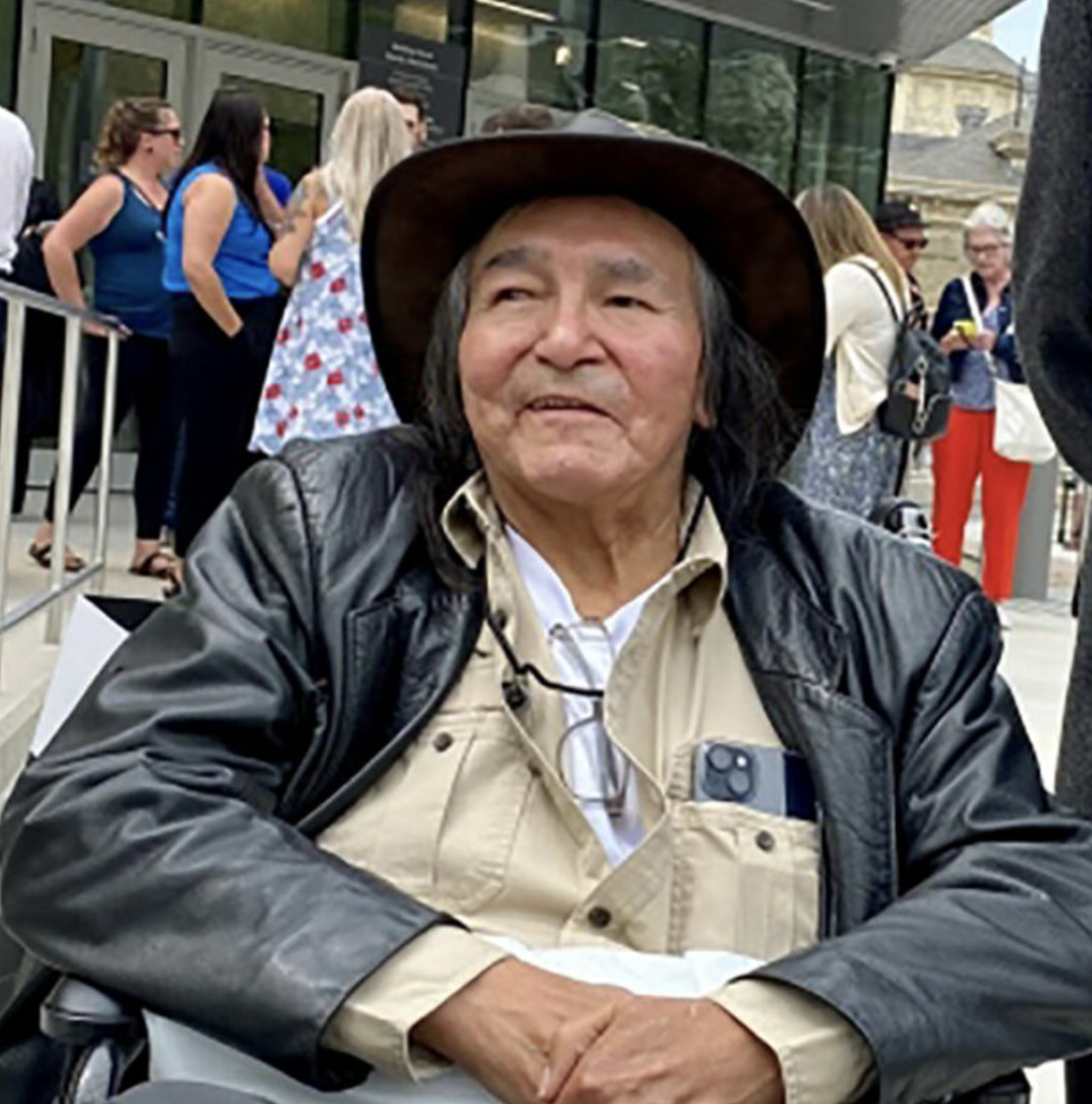
Allan Woodhouse (Innocence Canada)
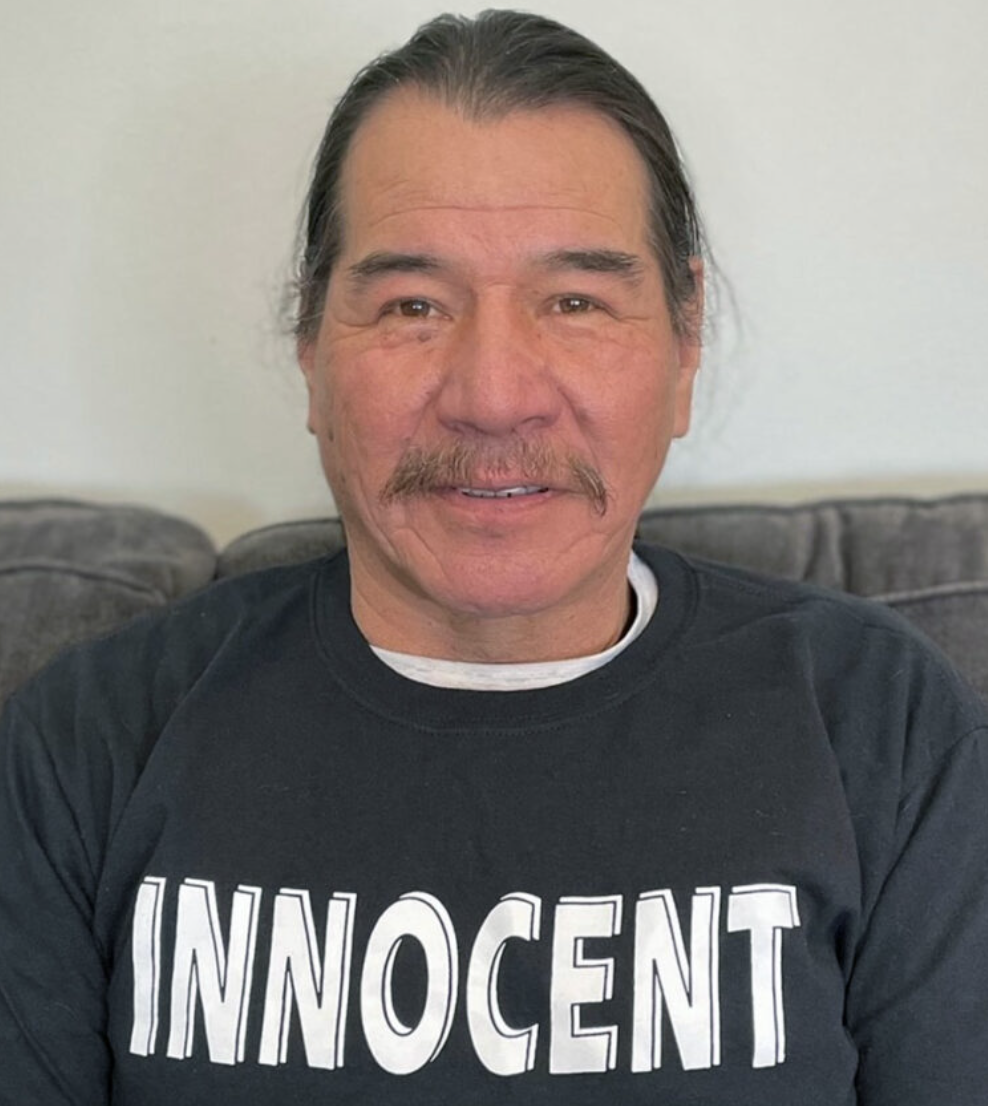
Brian Anderson (Innocence Canada)
Both of these men were from the Pinaymootang First Nation and later on moved to Winnipeg. They spoke limited English as it was their second language.
Their case goes back to 1973 when Ting Fong Chan, a 40-year old father was brutally murdered in Winnipeg. Witnesses claimed to have seen multiple men with long hair beating him up.
Shortly after, Brian Anderson and brothers Allan, Clarence and Russel Woodhouse became suspects of the crime. They were 18, 17, 21, and 19 years old respectively at the time.
They were arrested and all report being threatened and assaulted by officers before signing the confessions.
Important to note is that there was no interpreter present during Anderson’s police review. He says he was told he was signing a form to get property back that was taken upon arrest.
He was also falsely told that the three others confessed to being involved in the murder. Despite the fact that Anderson had an alibi, the lawyer present didn’t call his grandfather to confirm where he’d been the night of Ting Fong Chan’s murder.
The four men faced trial in front of an all white jury, and in 1974 they were convicted and sent to jail for life. Throughout everything, they maintained their innocence.
Decades later, they reached out to Innocence Canada, who brought the case to the Minister of Justice.
On Jul. 18, 2023, Brian Anderson and Allan Woodhouse were acquitted, as there wasn’t any evidence in the trial and prosecutor Michelle Jules notes that systemic racism impacted the investigation.
No one can give them back those years they spent in prison, but at last their innocence has been proven and recognized.
For many, the case of Brian Anderson and Allan Woodhouse show how systemic racism and police misconduct can upheave lives.
Another case of wrongful conviction that Innocence Canada helped to exonerate is that of Joyce Hayman.
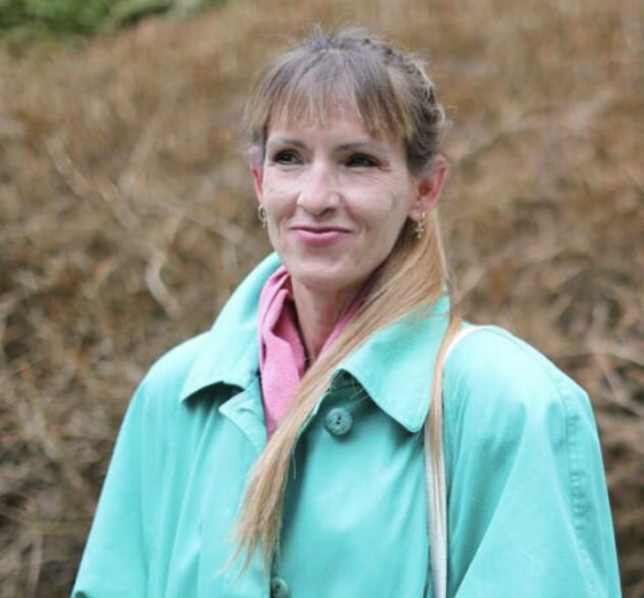
Joyce Hayman (Innocence Canada)
When she was growing up, she experienced poverty, neglect and abuse. At 15 years old she developed an addiction to crack cocaine.
She gave birth to a son in 1991. In his youth, he’d been brought to the hospital where doctors issued tests on him.
A urine sample tested positive for cocaine, then a hair sample seemed to confirm it.
The hair was tested at SickKids’ Motherisk Drug Testing Laboratory (MDTL). It found that the boy’s hair had such a high concentration of cocaine that these results couldn’t be explained by something like second-hand smoke.
Rather, he must have been fed cocaine on multiple occasions. MDTL’s lab manager even said that amount of cocaine would ordinarily be expected in adult chronic users and could kill a child.
He was taken away from his mother and put into foster care. Hayman was charged with two counts of “administering a noxious substance and criminal negligence causing bodily harm.”
She testified that she’d never given cocaine to her son and admitted that she herself was addicted. In 1998 she was sentenced to two years, less a day,
Because of these charges, when Hayman gave birth again in 2003 her second son was also taken away.
She tried to appeal her conviction but couldn’t afford the $3,000 for the trial transcripts and forensics evidence. But then in 2014, the overturning of a similar conviction changed everything.
Tamara Broomfield had also been convicted for administering cocaine to her son after an MDTL test. Broomfield’s counsel had presented fresh evidence challenging the test results, which also found astonishingly high levels of cocaine in her child’s hair.
After a judicial review, MDTL’s hair drug test was found to be unreliable, also finding that the lab had serious deficiencies. This lab’s faulty hair analysis results were found to have played a role in six criminal convictions not including Hayman’s, and thousands of child protection matters.
The judicial review also found that the MDTL program disproportionately affected Indigenous and Black families, who are overrepresented in Ontario Child Protection Proceedings.
The hospital later shut down their Motherisk program in 2019.
With the Crown’s consent, the Ontario Court of Appeal granted Hayman’s application to reopen her conviction appeal. She was acquitted in April 2021.
According to the John Howard Society of Canada, one of the potential causes of wrongful convictions is that the jury gets swayed emotionally by evidence that’s considered to be beyond reasonable doubt.
Even though the drug test was a factor in Hayman’s conviction, she admitting to her cocaine addiction played a significant part in the case. Drug users have always faced a stigma that influences peoples’ perceptions of them.
These negative perceptions and the invalid drug tests caused this innocent mother to lose both of her children.
It’s important to stay aware of the possibilities of wrongful conviction and its effects, because it can happen to anyone.
For those seeking help, Innocence Canada accepts applicants who are convicted of a homicide offence they’re innocent of, as well as unsuccessful appeals of convictions.
To see fewer wrongful convictions, the John Howard Society of Canada offers a few points of advice:
- Confessions shouldn’t automatically be accepted as evidence of guilt
- Eyewitness testimonies should be treated with caution
- Appeal courts should be more active
By acknowledging the flaws of the justice system, we can continue to work towards getting the wrongfully convicted acquitted and reduce the amount that suffer from miscarriages of justice.
Wrongful Convictions in the Canadian Justice System
Oct 21, 2024 • Christelle Dorvil

